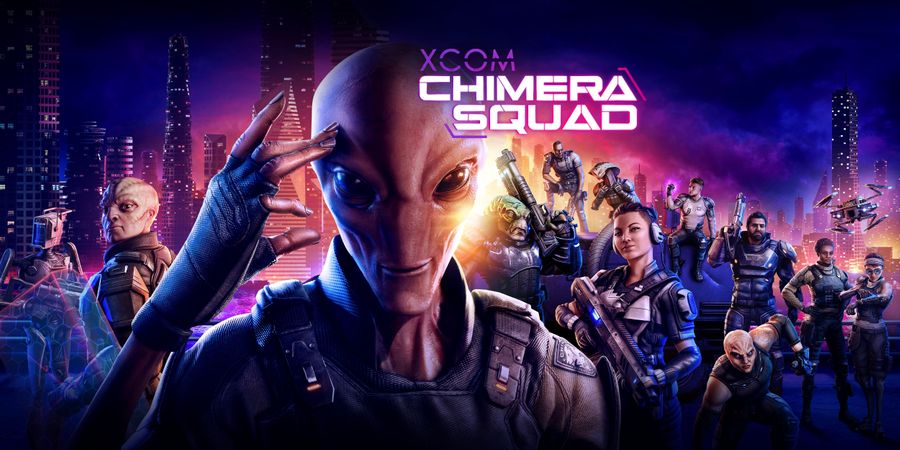I've mentioned it in the past and I will mention it again. I love turn-based games, tactics games and, to a certain extent, roleplaying games. The XCOM franchise is one of those beautiful little things that combines a small amount of each genre.
XCOM: Chimera Squad isn't so much the next bold step for the XCOM, instead it's more of a step to the side. Inside, you'll find a shake-up in mechanics, art style and tone. Underneath, the game is still built on the existing successful core mechanics, and really showcases the depth of Firaxis' XCOM platform.
XCOM saw humanity band together to defeat invading aliens, about which they knew very little. XCOM 2 was a twist in meta-narrative whereupon humanity was defeated in the initial invasion and proceeds to fight a guerilla war to reclaim the earth. I don't know why I explained the premise of those two games for you. But I did - and it's good framing for XCOM: Chimera Squad.
The premise of both core titles was evil aliens exist, and you should kill them by any means possible. Those who survive got gruesomely cut up in your autopsy lab. They were enemies - and enemies that you didn't feel awful about when you blasted them apart. Chimera Squad is a play on the old adage of 'what do you do when there are no wars to fight'. Set five years after the events of XCOM 2, Chimera Squad sees those survivors - human and alien - forced to pick themselves up and forge a path anew, side by side, as comrades instead of bitter enemies. History tells us, sometimes, that isn't so easy.
In contrast to the first two XCOM titles, which were international affairs, the events of XCOM:CS are entirely localised to the generically titled 'City 31'. The city is intended to be a shining example of different races, colors and creeds, working together to achieve harmony. But it's an uneasy peace, and the scars of the previous war are still very fresh, even five years later. Folks are still figuring out how to live with one another - and the undercurrent of tension and disharmony is a constant threat to boil over and have the city descend into anarchy.
This is where you come in. You're an experimental branch of XCOM - the so-called "Chimera Squad". A group of diverse and multitalented individuals who act as backup and support for City 31's police department. In your travels, you'll deal with organised crime subfactions, keep the peace, deal with hostage negotiations and much more. All in the name of keeping the city - and all of its citizens, be they human or alien - safe.
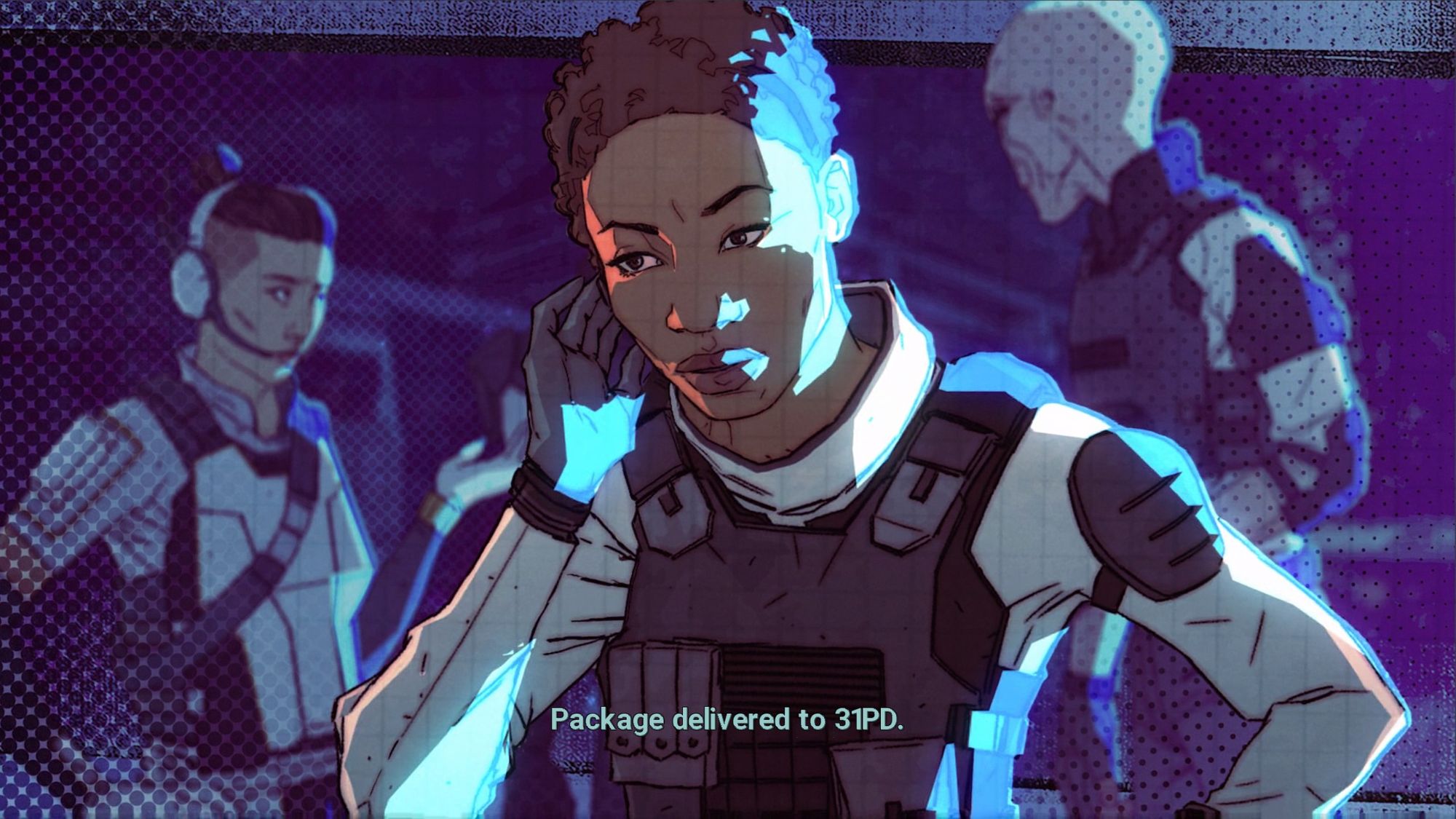
You also get a cool set of wheels to respond to incidents across the city with, although it looks like an absolute pain in the ass to park. Good thing XCOM didn't introduce a driving minigame.
Chimera Squad builds on XCOM's roots and takes the game in a different direction. It's a smaller, more focussed experience and the mechanics are constructed to support a game which is less centred around you being humanity's only hope. You're policing a city - you don't need an RnD department, or a big factory to produce stuff. You need practical equipment, strong sturdy body armor and a truncheon to knock fools out. Leave the glowy objects to the scientists.
XCOM:CS also has a much stronger narrative focus than previous titles. Whereas you made your own stories and drafted your family members into the services to fight the aliens (sorry about that Muton crushing your skull, Dad), Chimera Squad presents a pre-built set of characters to draft into your squad. There are eleven characters, but only eight spots on the party bus - so you have to choose wisely. Each character has a name, biography and dialogue lines unique to them. I use this phrase a lot, but this helped to build immersion and make the characters matter more - because no more are they just templates to impart character on, they're part of the world. I felt like I knew who I was recruiting into my squad - and they were more than a set of abilities.

I couldn't help but enjoy and maybe have a hearty chuckle at the way the different characters interplay with each other - such as the sequence early on where Torque implies she had cooked and eaten a Canadian, much to the horror of the group's intel officer, Whisper.
It's in this way the tone of the game shifts away from being grim and dark, where humanity is on the verge of extinction and every mistake will be your last. The tone is a lot lighter - and there are overtones of hope. Between missions, you also listen to radio broadcasts. The content of these help with tough tasks like worldbuilding. Sometimes you'll hear about a venue, or an ad for a new product (shoutout to BIG CRUNCH). But you'll also hear and learn about strikes and discontent between the city's diverse populations. City 31 is more than just a big empty frame - it's a place, with people and stories, filtered through the lens of your organisation's radio.
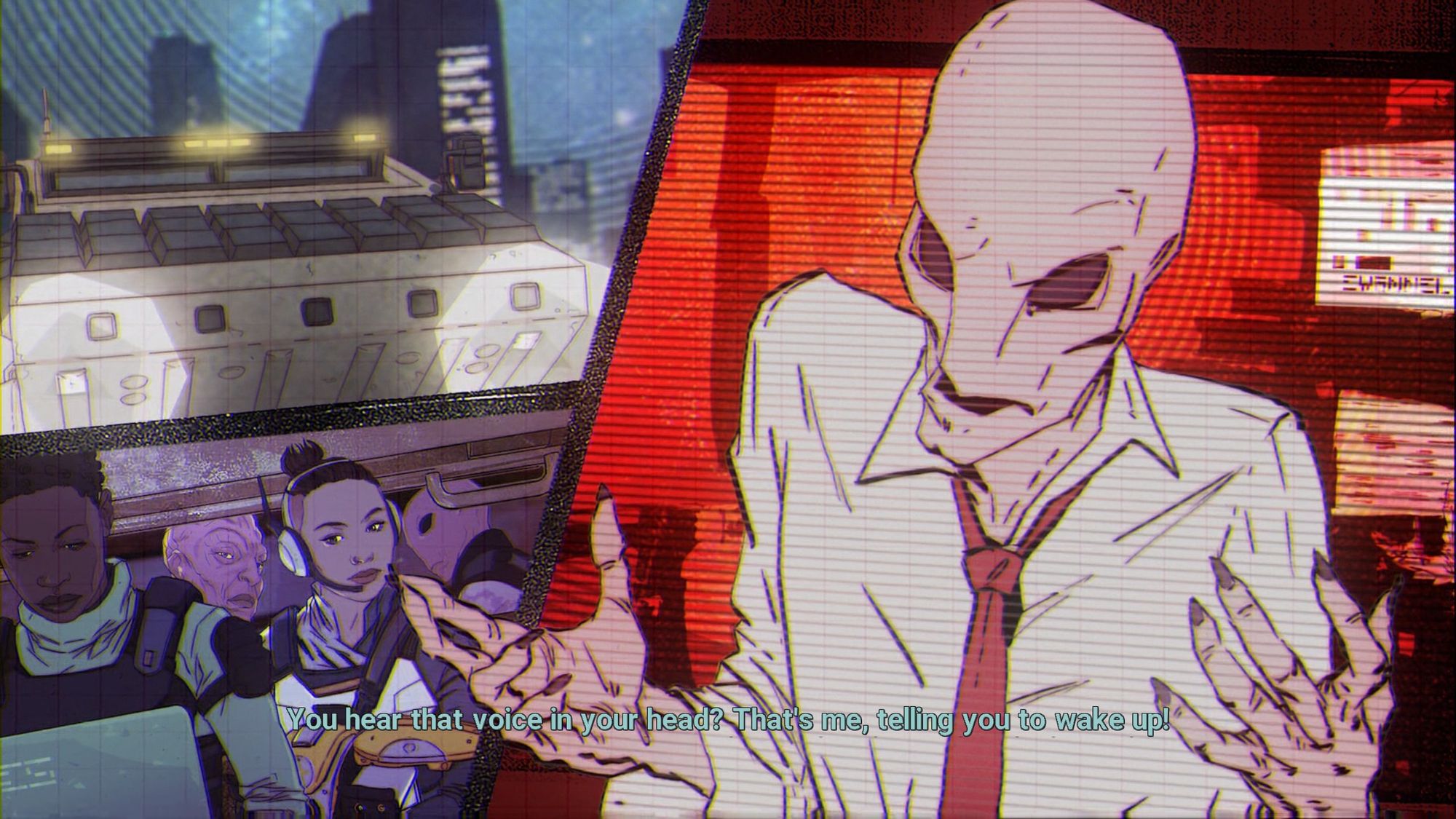
I said before that the core of XCOM (and everything that goes with it) is still here. It's turn-based, there's cover mechanics, unique abilities and all the small nuances that have been improved over the last two titles. It's clear Firaxis still have progress to make on the game engine, as I still had a lot of problems with folks being able to see and shoot enemies through walls. Certainly I encountered my fair share of bugs and technical issues.
Before we truly get into what's different about the combat, we have to get into the gameplay loop breakdown. The pre-combat loop has you deal with researching new equipment, sending your agents on 'Spec Ops' missions to gather resources and training your operatives. There's also management of the City 31 'situation map', which looks like a really tiny, well laid out Cities: Skylines city. From there you'll manage district and city unrest and deploy field teams, the game's replacement of sorts for satellites and relays.
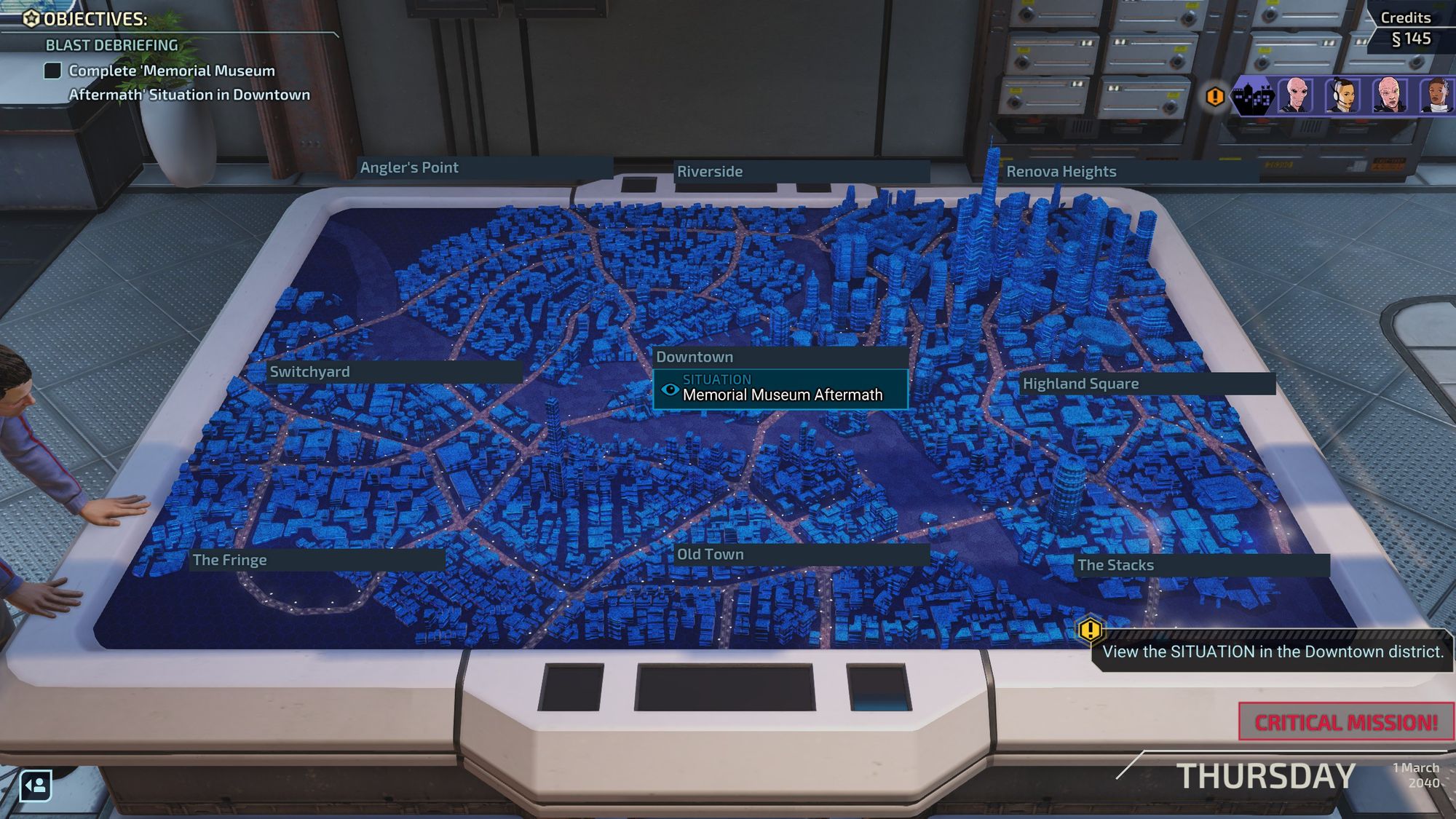
As the game is smaller in scope, the pre-combat loop is certainly less impactful than in the core titles. I never felt I had hamstrung my team by picking the wrong research, or buying the incorrect item. This isn't so much a shortcoming, but rather a readjustment of weighting to the combat loop.
The core combat loop is where the lion's share of changes have been completed. To start with, each mission is broken up into a series of encounters, no more than three and usually one to two. Each encounter takes place in a large room, or series of smaller rooms. This keeps the action tight and focussed, as there's nowhere really to hide your troops to poke holes in your enemy, or slowly creep forward triggering overwatch. In fact I found overwatch to be quite a poor investment of an operative's time. There's also lot of variety in environments and more verticality in the designs than in previous titles.
However, Before the bloodshed begins in earnest, there's a new "Breach Mode" - which represents the squad's shift in role from soldiers to police officers. You assign team members to breach spots, use unique items designed for the phase (such as scanners and flashbangs - like a real SWAT team!) then kick down the door and start blasting. Sometimes agents need special tools like breaching charges, keypads or may even have a racial affinity with certain breach locations, such as Torque's ability to sneak through grates and drains.
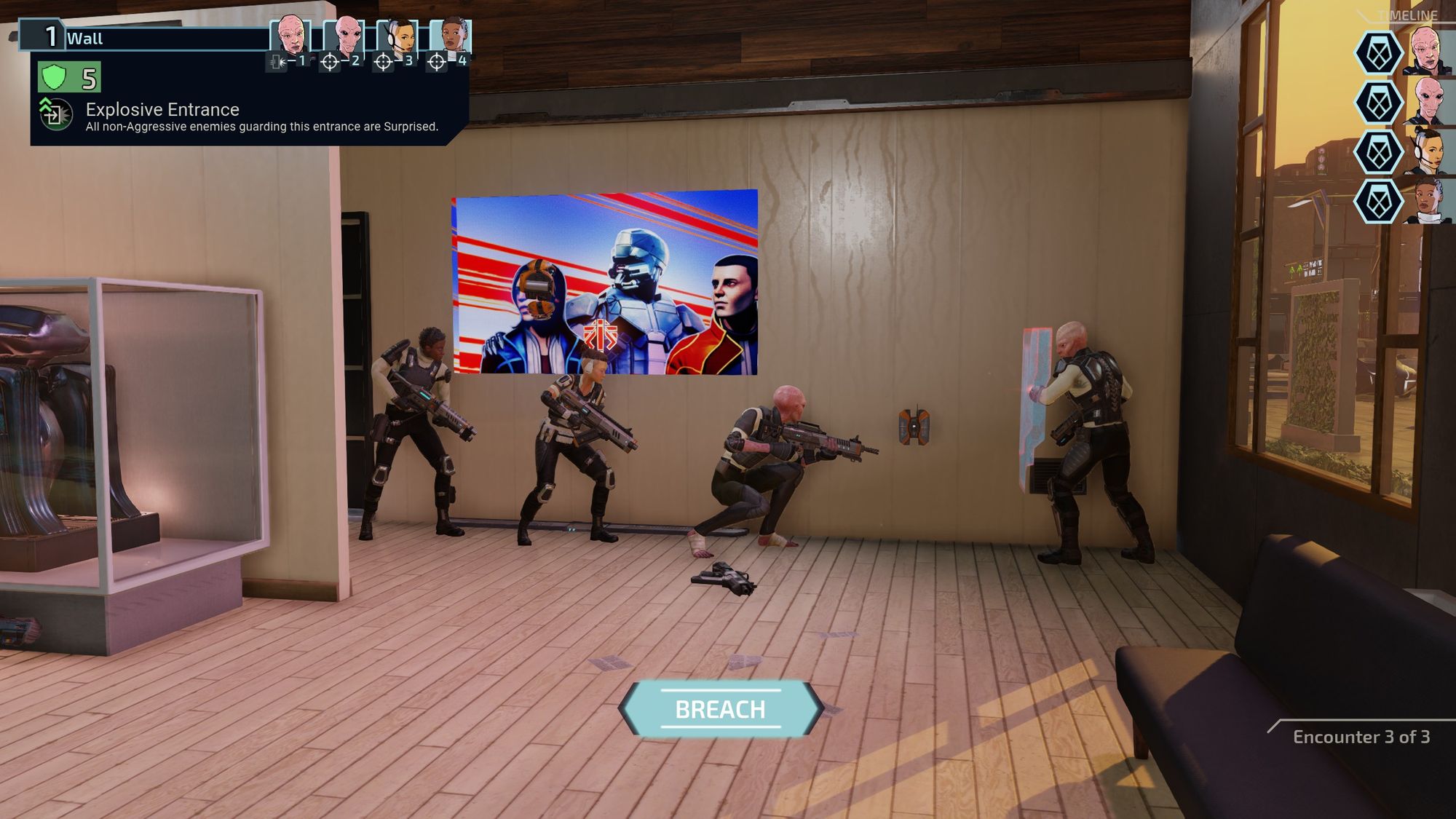
The developers were clear in the gameplay trailers - you will not be able to clear a room in the breach phase. They meant it. The game is tightly balanced to prevent this - and sometimes it isn't even in your best interest to try. Often that's a way to get your team murdered in a hurry, as you bust down the door only to realise the goons inside were expecting you and blast you into atoms.

Once all the fun of breaching in has died down, the combat begins in earnest. There's a combat timeline now which all units in the encounter are placed in. This puts a greater value on abilities that can stun or otherwise disable enemies before they can act, minimising their impact.You're also provided with a once-per-mission ability which moves another operative in the timeline. This is great, for example, when trying to escape a hostage situation and one operative is at the top, but your other operative will get shot five times before he gets to act. It also encourages tactical thinking. How hard do you work to neutralise a foe who is due to take his turn next, but is relatively harmless, versus a more dangerous and closer foe who has a turn further down the order.
With the reduced encounter size and the much closer, action-oriented room design, this action timeline model starts to make a lot of sense. It does wonders to prevent one side (probably the enemy side, let's face it) being nuked out of existence before acting. The two changes really synergise well together and gave the game a sense of being faster and more frenetic, compared to the patient and calculated style of the core titles.
With the change in pacing, came a change in my own personal tactics and playstyle. Setting overwatch was often a poor use of an operative's action, but other abilities that didn't cost an action or that didn't end the operative's turn straight away were tremendously helpful. These included abilities such as Cherub's Kinetic Shield, which saved my bacon on more than one occasion.

Of course you can't just go around killing criminals without trial and letting civilians get killed. If you let citizens get killed, you'll lose money. If you kill your enemies instead of rendering them unconscious, you'll lose an opportunity to gain intel, which is very valuable. The game gives you tools to encourage you to treat your role as law enforcement - and not soldiers - seriously. The choice to use items like tranquiliser rounds and weapon impact frames to incapacitate enemies and have that choice actually be worth the trade-off in more powerful secondary items, is an excellent little piece of gameplay balance. It also helped to build my beloved immersion.
Of course, it's not all sunshine, rainbows and waltzing through combat encounters putting folks to sleep. Your enemies have no such compulsions and will do their best to kill your operatives. As your operatives are characterised, they cannot be killed, only incapacitated. Allowing an operative to bleed out will result in mission failure, which restarts the current mission.

If you successfully stabilise an operative, they're evacuated to the APC. The operative will be debuffed with a scar, which requires training to heal. You'll have to take them off active duty to train them - just like real, flawed people. Or in this case, a flawed snake police officer:
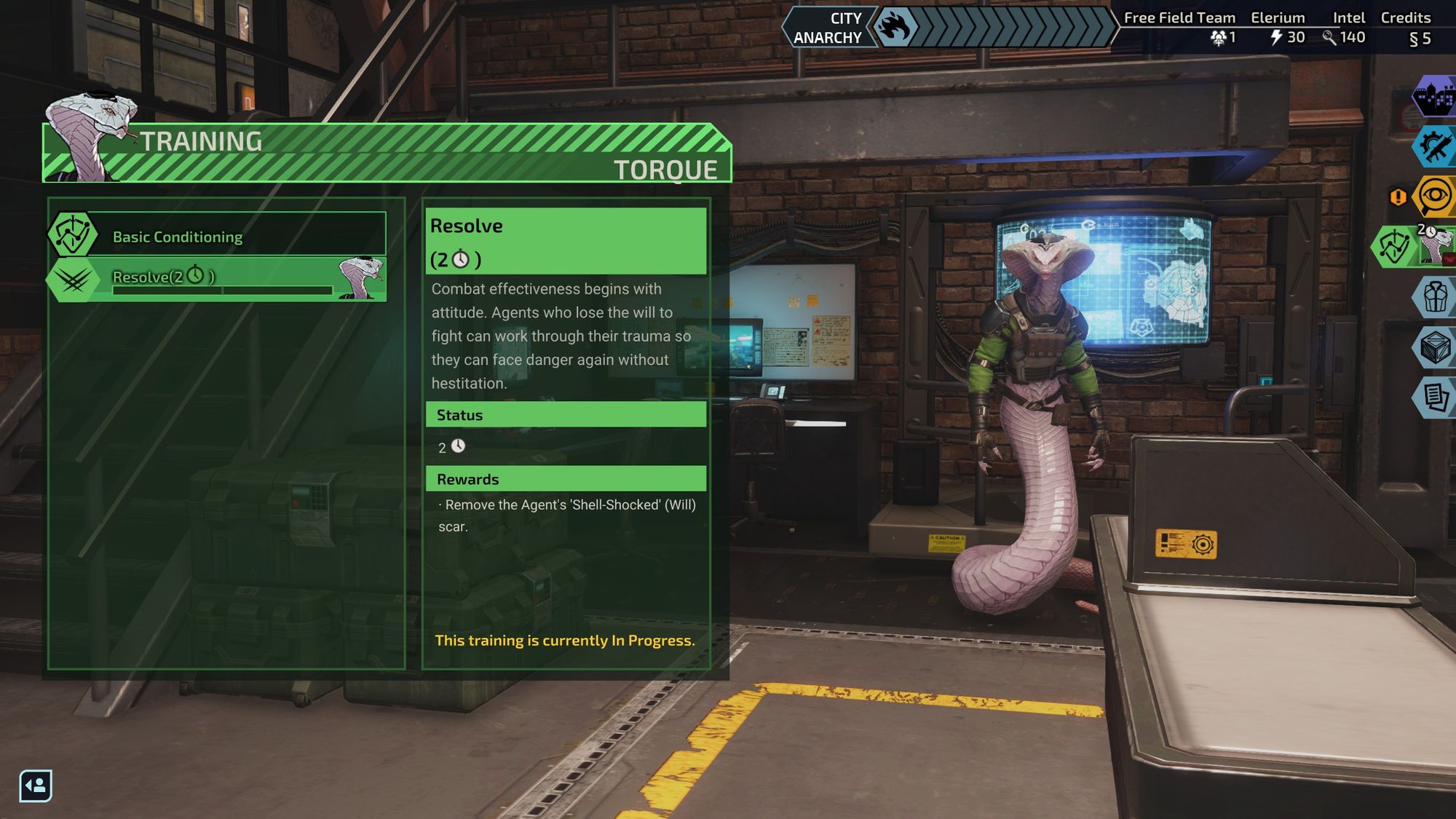
If you survive an encounter with evacuated operatives, the show must go on. There is no turning around to come back next Tuesday. This means that you are often trying to accomplish a task undermanned as enemies grow in number, testing your tactical acumen. You can purchase Androids to fill in for injured squadmates, but don't expect them to do much other than the bare minimum. Fortunately if you flunk out of an encounter, the game is normally supposed to put you back at the start of the mission. I did have one mission where it didn't and put me back at the start of the encounter, two squadmates down. I also had iron man mode on, which prevented me from restarting the mission. It took me twenty-five attempts and an ungodly amount of luck to get past that point. Needless to say, I was much more careful for the rest of my playthrough.
Whilst all round the game is of a high quality, XCOM:CS is not particularly long, and there's not a lot of content. Both core titles have a point where the majority of research has been completed and you're free to enjoy the downhill slalom. The game is so short, you never really hit that peak - though that does help to keep the gameplay engaging.
The core plot sees you investigating three different organised criminal factions. Each different than the other at surface level, with different motivations and objectives you learn about as the game goes on. There are also unique "Dark Events", like in XCOM 2, that add extra challenge and allow them to be completed in any order. Despite this, the factions seem to very bland and lacking in real flavor, especially considering how developed the rest of the game is. As it stands, you have very little interaction with key characters in each faction, which is a bit of a bummer.
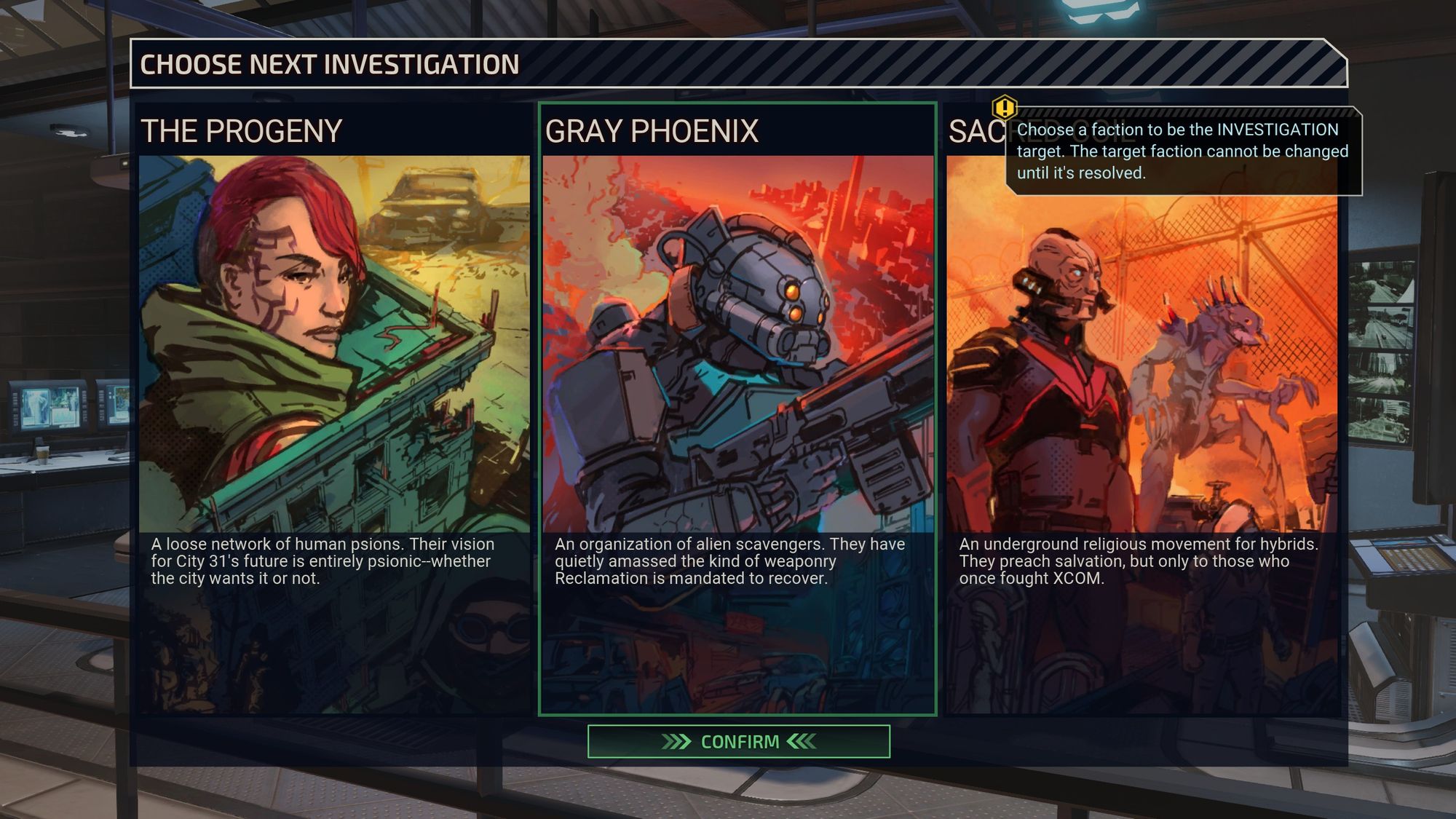
You can complete missions to reveal key missions earlier, which can give you vital breathing room to finish important weapon or item projects. All together, the campaign took me less than twenty five hours in total on hard difficulty, and the conclusion left me craving more. However, it is important to note that the game was not meant to be XCOM:3 and was priced at $25 ($5 on launch). It was always intended to be something different - and I'm glad it exists.
Overall, XCOM: Chimera Squad is an excellent addition to the franchise. It is something different. It's a more story-driven title and better for it. Longstanding fans of the series will appreciate the small call-backs to XCOM and XCOM 2 and even new fans who haven't played the previous games will still find something to enjoy here. I wholeheartedly recommend XCOM: Chimera Squad and snake police officers.
Catch you next time,
Vulkan
Did you like this article? Did you hate it? Go over and keep the discussion going on the official Vulkan's Corner facebook page! - whilst you're at it, leave a like!
